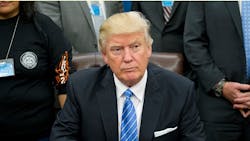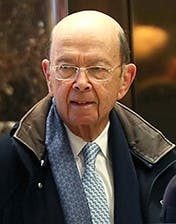Sneaker producers, automakers and retail giants are facing tumult in their international operations as President Donald Trump pushes ahead with a dramatic overhaul of U.S. trade policy.
His decision not to join the Trans-Pacific Partnership and pledge to renegotiate the North American Free Trade Agreement are forcing companies to rethink supply chains and capital investments in a new era of protectionist policies. Trump’s moves weigh heavily on importers such as Nike Inc. and Ford Motor Co. as he seeks to boost domestic manufacturing and create jobs.
“Any company right now that is global is trying to understand what will change,” said Simeon Siegel, an analyst with Instinet LLC, a New York broker. The effect on supply chains, taxes and cost structures “is obviously very much in question.”
Trump on Monday signed papers that he said would fulfill promises to tackle trade policies immediately after taking office. During the campaign, Trump routinely derided the pacts as job-killers, calling TPP “a potential disaster” and saying NAFTA was “one of the worst deals ever.” While the administration didn’t release the documents, the president has said he would prevent U.S. jobs from being outsourced and may impose punitive tariffs on imports.
“A lot of multinationals and industrial companies will be very disappointed about the abandonment of the TPP and will be facing a lot of uncertainty with the renegotiation of NAFTA,” said Caitlin Webber, a trade-policy analyst with Bloomberg Intelligence.
Wilbur Ross Influence
Wilbur Ross, Trump’s commerce secretary nominee, has a key role in shaping the president’s views on NAFTA, said Steve Miller, chief executive officer of International Automotive Components Group, which is more than 60% owned by Ross’s private equity firm, WL Ross & Co.
“I’m glad we have responsible adults surrounding Trump that will make things better for America without hurting trade,” Miller said in an interview. “Wilbur has said he supports tweaking NAFTA, not blowing it up.”
TPP, however, appears definitively abandoned. That could be a blow for major apparel and footwear companies such as Nike. The world’s largest sports brand, which makes Air Jordans and other shoes in Asia, was counting on the pact for savings on import tariffs. The company sources about 40% of its shoes from Vietnam, a TPP member nation.
Many multinational companies with investments in Asia will now likely reassess strategies, said Bloomberg Intelligence economist Fielding Chen. Companies with manufacturing facilities have been moving away from China to countries such as Vietnam to take advantage of cheaper labor costs, he said.
“Trump’s decision will make companies hesitate about what to do next," Chen said. “This won’t have significant impact on companies’ overall arrangement of their Asian supply chains. Now manufacturers will slow down the decisions and may also consider other Asian destinations.”
TPP also would have generated savings for retailers such as Target Corp., Foot Locker Inc. and Wal-Mart Stores Inc. The cut in import costs would have been $450 million a year, according to the Footwear Distributors and Retailers of America.
“It won’t make people that happy if the price of tennis shoes goes up, if the price of clothing goes up and if the price of motor vehicles goes up,” said Donald Grimes, an economist at the University of Michigan. “That contradicts the idea of making people better off.”
Not all industries supported the pact, though. U.S. automakers and steel companies opposed what they saw as insufficient measures to discourage currency manipulation, Webber said.
Labor Groups Cheer
Labor groups Monday cheered Trump’s moves. United Auto Workers President Dennis Williams commended the president for withdrawing from the “deeply flawed” and “corporate-driven” TPP. Richard Trumka, president of the AFL-CIO federation of trade unions, called the TPP exit and NAFTA pledge “an important first step” and pledged to fight for “new trade and economic rules that end special privileges for foreign investors” and big drugmakers.
Renegotiating NAFTA could have far-reaching implications for an auto industry that imported almost $80 billion worth of passenger vehicles and $68 billion of parts into the U.S. from Canada and Mexico in 2015. That’s about 44% of imported vehicles and 47% of auto parts, according to the International Trade Administration.
Idle Speed
Carmakers are already putting off investments until they know how the trade relationship between the U.S. and Mexico will change, said Eric Noble, president of The CarLab, a consulting firm in Orange, Calif. The added costs could make the roughly $1 billion that carmakers invest in each new assembly plant too risky until executives know what Trump wants to do, he said.
Automakers have been a frequent target of criticism by Trump, who threatened General Motors Co. this month with a “big border tax” on Mexico-made cars. The company subsequently announced a U.S. investment plan. Likewise, Ford canceled plans to build a new plant abroad and said it would create 700 new U.S. jobs instead.
On Tuesday, the president will meet with the heads of Ford, GM and Fiat Chrysler Automobiles NV, press secretary Sean Spicer said.
Both Canada and Mexico have said they’re willing to open talks on updating the 23-year-old NAFTA agreement. Insistence on a mechanism for balancing trade between the U.S. and Mexico or pushing for a specific import tax on Mexican goods to offset that country’s domestic value-added tax would spell trouble for the pact, said Scott Lincicome, an international trade attorney with White & Case in Washington.
Negotiations also could include changing or eliminating the NAFTA panels that handle disputes and modifying rules of origin, which set how much local content is needed to make a product eligible for lower NAFTA tariffs.
“If these end up being hypertechnical negotiations on rules of origin, I don’t think you’re going to see a significant controversy,” said Lincicome. “If they’re really broad-based radical changes, then you have a totally different story.”
Trump’s tough talk will likely give way to the reality that open economies bring prosperity, said Lance Fritz, chief executive officer of Union Pacific Corp., the largest publicly traded U.S. railroad. The answer to worker dislocations caused by trade and, to a higher degree, by technology and automation, is retraining, said Fritz, whose railroad operates at six border crossings with Mexico and handles cargo from Asia at West Coast ports.
“The international economies today are tightly woven together,” he said.
By Richard Clough, Thomas Black and David Welch
About the Author
Bloomberg
Licensed content from Bloomberg, copyright 2016.

